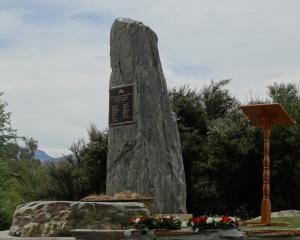The two bulldogs, Colonel Tiger Jim, and Major Taipo, who accompany the Otago Infantry Battalion with the New Zealand Expeditionary Force, are not merely appendages with no official standing. Each is as much a part of the regiment as is the ordinary soldier. Their names are on the roll under the heading of ''Regimental pets''.
Like the soldier, each dog has his kit bag containing his uniform and (unlike the soldier) his little individual tent. A ''dog'' orderly is duly appointed, and it is his duty to groom the dogs, draw their rations, and see to their comfort generally.
To see the broad-chested, snub-snouted Colonel Tiger Jim in the uniform of his rank striving to maintain the dignity of his position with a peaked cap, held by an elastic band at a rakish angle over one ear was to laugh.
While the Major is disposed to be frolicsome, the Colonel, with a consciousness of his superior rank, maintains an impressive gravity which is only relaxed when there is an opportunity for a mill with the major - for the sad confession has to be made that these two officers are strangers to that spirit of camaraderie which should characterise the relations of brother officers.
These dogs will probably be left at the base when the men go forward to the firing line. Marching is not a strong point with the bulldog. He cannot keep pace with troops on a lengthy march.
Consequently in the Boer war it was not uncommon for British troops to come across a derelict bulldog on the veldt.
Examination of the inscription on his collar would disclose the unit to which he was attached, and he would be taken along, to drop out of the ranks again and be picked up by the next force to come along.
The British soldier regards his regimental pet with an almost superstitious devotion. At Edinburgh Castle there are tombstones erected to the memory of regimental dogs.
• We sincerely trust that the people of New Zealand, whose generous instincts have been stirred by the call of the Empire and by the need of providing for the least favourably situated among the inhabitants of the Mother Country and of the weakest of the gallant allies of Great Britain, will not be insensible to the distressing condition of those who have been suddenly plunged into grief and threatened with want in our own land as the result of one of the most serious disasters that have been experienced in the industrial history of the dominion, the Huntly mine explosion.
Fortunately, Parliament has made provision in various ways to meet the needs of those who may be bereft of their breadwinners through an accident such as has afflicted some forty families at Huntly and cast a gloom over the entire population of that centre.
A certain amount of help is obtainable also for the sufferers from the Coalminers' Relief Fund, of a maximum amount of 50, and the majority of the widows, moreover, possess the qualifications that will admit of their receiving the pension payable to widows with children under fourteen years of age dependent upon them.
When all these sources of assistance are taken into account, however, it will be seen that they do not place the recipients beyond the reach of want.
- ODT, 24.9.1914.

